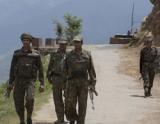As the Government closely monitored the situation after the attack, Pakistan High Commissioner Salman Bashir was summoned to the Foreign office here. Defence Minister A K Antony said the Indian government will convey to Pakistan its protest against the attack yesterday in the Mendhar sector in Poonch district. 
"Pakistan Army's action is highly provocative. The way they treated the dead bodies of Indian soldiers is inhuman. We will convey our protest to Pakistan government and our DGMO will talk to his counterpart. We are closely following the situation," Antony told reporters.
External Affairs Minister Salman Khurshid said the way the bodies of the two Indian soldiers were treated was "extremely extremely distressing" and "ghastly" and that this will be taken up seriously with Pakistan.
"It is an extremly sensitive matter. It is a matter of great concern. We will do whatever we can do," he said, adding "We will take up the matter seriously with Pakistan government"
Khurshid warned that the Pakisran action could be "counter-productive" in efforts by the two neighbouring countries to improve bilateral relations. Condemning the brutal killing of the two Indian soldiers, BJP said this is a "warning" to India and asked the Government to place all the facts before the international commnity so that Islamabad can be named and shamed before the world at large.
Pakistani regular soldiers crossed into Indian territory in Poonch sector and ambushed an Indian patrol killing two soldiers, one of whom was decapitated. Army's Additional Director General (Public Information) Major General S L Narasimhan yesterday confirmed that one of the two bodies was mutilated.
Other sources said the heads of both the Indian soldiers -- Lance Naiks, Hemraj and Sudhakar Singh -- have been chopped off and one was taken away by Pakistani intruders.
The attack took place along the Line of Control(LoC) in Poonch district when Pakistanis came about 100 metres into Indian territory and assaulted the patrol party. Besides killing two, they also injured two other soldiers and took away their weapons and other belongings.





Comments
Add new comment